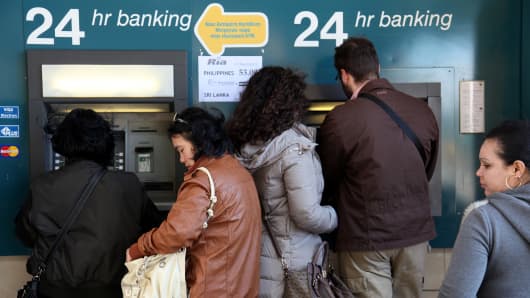Second, there are safety measures in place in Europe that may contain the fallout. The European Central Bank has its OMT (bond-buying program) where it can buy bonds. It can also revive its three-year long-term refinancing operation (LTRO) that provides 1 percent loans to banks, which stabilized Europe when it was introduced in last 2011 and early 2012.
And the Emergency Liquidity Assistance (ELA) fund also allows the banks in Cyprus to borrow from the ECB.
All of this greatly reduces the chances of a major bank run in Europe.
Let's also be honest about what is going on in Cyprus: Bank deposits there are dominated by Russian oligarchs and money from questionable sources. Bank deposits in Cyprus amount to 68 billion euros, according to Goldman Sachs — four times its gross domestic product! In other words, Cyprus is a money-laundering haven. How are the Germans and the Finns going to explain this bailout to voters?
The biggest laugh on the desks this morning has been local (unconfirmed) media reports that Russian gas giant Gazprom is offering to restructure (guarantee?) the Cyprus debt in exchange for gas exploration rights. You can't make this stuff up.
Remember: There is talk that the Cypriot government was offering shares in banks, and shares of revenue from gas fields.
(Read More: 'Unfair, Dangerous' Cyprus Deal Whacks Rich Russians)
With all that said, this is bad news for Italy and, to some extent, for Spain. There's a reason that, beside Russia, Italy and Spain are the worst markets in Europe, down about two percent: This tax (confiscation) of depositors will strengthen the anti-euro crowd and make it much more difficult for Italy to form a government. This will strengthen the Beppe Grillo crowd, and increases the chances that voters will turn even more anti-austerity.
Another problem: This makes a banking union much more difficult, where there would be a region-wide deposit insurance fund.
What does it mean for stocks? The last correction was at the end of February, when disappointment over the Italian elections briefly hit the S&P 500 by about three percent. That lasted less than two weeks.
If the market thinks Cyprus is a one-off event, this will fade in a couple days.
The end of the quarter may also complicate matters. With 10 days left in the quarter, do traders take advantage of the dip to buy (which has been the trend) or should those who have secured big gains in the quarter nail them down? I suspect a little of both, but remember: I noted last week the S&P 500 was up 10 percent, but the average long/short equity hedge fund was up only 4.9 percent.
European banks like ING, Deutsche Bank, and Barclays are down three to five percent.
Elsewhere:
1) China is down 1.7 percent, partly from the Cyprus fallout, but there's also continuing concern over that country's overheating property market. February property prices for 70 cities were released: New home prices were up in 66 of 70 cities, existing home prices were also up in 66 of the 70. According to TD Securities, prices in Beijing were up 2.2 percent from the prior month, 1.7 percent in Guangzhou, and 1.6 percent in Shanghai.
Also, Nomura is warning that easy monetary policy in China is risking a rise in inflation and an increase in leverage that could create a financial crisis in 2014.
2) IPOs heat up: Looks like a busy week for initial public offers, with eight coming to market seeking to raise about $1.3 billion.
—By CNBC's Bob Pisani










